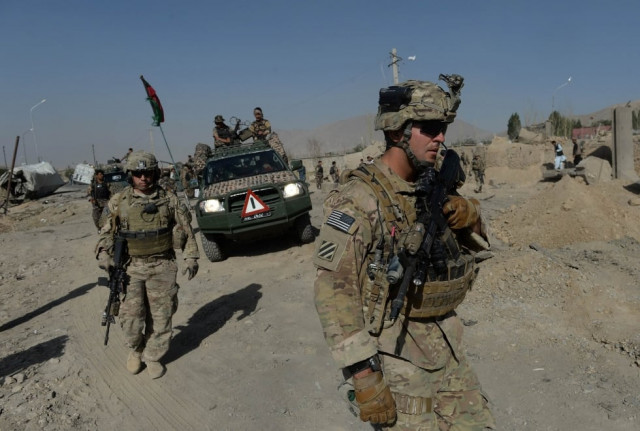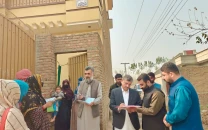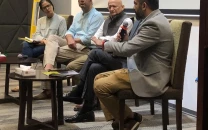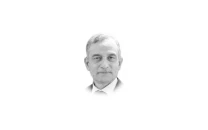Trump tough talk unlikely to move Pakistan
US forces still need access to Pakistani supply lines and airspace

PHOTO: AFP/FILE
Trump's predecessor Barack Obama risked triggering a breakdown in the long US alliance with Islamabad when, without forewarning, he sent commandos into Pakistan in 2011 to kill al Qaeda leader Osama Bin Laden.
But, rhetorically at least, Trump's much anticipated national address on Monday, in which he laid out a new strategy to win the United States' longest war, marked a dramatic increase in pressure on Pakistan.
"We have been paying Pakistan billions and billions of dollars at the same time they are housing the very terrorists that we are fighting," Trump said.
Pakistan preparing 'detailed response' to Trump’s allegations, says official
"That will have to change and that will change immediately."
While Washington may hope that this motivates Islamabad to crack down on the groups that launch attacks into Afghanistan and Indian-administered Kashmir, it does not come without risk.
Harsh US measures could provoke Pakistan and, if the government feels its Cold War-vintage pact with America is under threat, it could turn towards China -- the great rival of both India and America.
And, much more than the implied threat to cut military aid to Pakistan, Trump's request that India play a greater role in stabilizing Afghanistan will rattle New Delhi's most bitter and long-standing foe.
But, US experts agree, Pakistan is unlikely to step up its support for the Haqqani Network and the Afghan Taliban if that would mean the collapse of the Kabul government and driving out US troops.
Instead, despite some of his more vainglorious rhetoric, Trump's revamped strategy could lay the basis for dealing with Afghanistan as a long-term chronic problem rather than an imminent threat.
After Trump’s criticism on Pakistan, US envoy meets Khawaja Asif
James Jeffrey, a fellow of the Washington Institute and former senior national security adviser to the George W Bush White House, said: "There's really no way to pressure Pakistan."
Pakistan has made the decision that keeping Kabul out of India's orbit is more important that clamping down on cross-border militancy, and cutting aid would only be counterproductive, he argues.
Beyond Afghanistan, the United States has an interest in preventing Pakistan from going to war with India or collapsing and allowing its government or nuclear weapons to fall into the hands of extremists.
And, while the US footprint is smaller now that it was at the height of the occupation, its forces still need access to Pakistani supply lines and airspace.
"There's really very little we can do," Jeffrey said. "To cut all aid or, even more dramatically, to start striking the Haqqani network and all that ... doesn't guarantee that they'll do what we say."
But Pakistan also has no interest in driving the United States out, and Jeffrey sees Monday's speech as confirmation that Trump has come around to the idea of a strategy of "long-term containment."
China defends Pakistan after Trump criticism
"Other than the unfortunate reference to 'winning' there -- that's something that nobody can promise because no one can achieve it -- I think that this is basically sensible strategy," he said.
Sadanand Dhume, an Indian commentator and resident fellow at the American Enterprise Institute, argued that Washington has many tools at its disposal to turn up the pressure on the Pakistanis -- from cutting military aid, to stripping them of allied status or declaring them a state sponsor of terror.
But the biggest stick may be the outreach to India.
"The US have always encouraged Indian involvement in Afghanistan, but it was careful not to step on Pakistani toes," he said.
"What we're seeing now, is the US feeling it no longer needs to be that careful about Pakistani sensitivity," he said, admitting that, after 16 years of war, it is hard not to be skeptical about Trump's chances of success.
Seth Jones, a former senior Pentagon official and now director of RAND Corporation's International Security and Defense Policy Center, sees room for a more stable future with a better balance of power.
"Pakistan certainly doesn't want Afghanistan to collapse and nor do they want an Afghan government that is strongly and closely tied to New Delhi," he said.
"I think what they'd like is a relatively stable Afghanistan, and one whose government -- and some of the tribal and sub-tribal actors near the border -- have at least decent relations with Islamabad."
And key to all of this, all experts agree, is that the US military remain in Afghanistan for the long haul.


















COMMENTS
Comments are moderated and generally will be posted if they are on-topic and not abusive.
For more information, please see our Comments FAQ